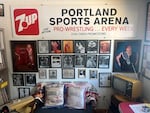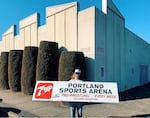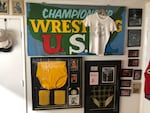
Kerby Strom has been collecting pictures, gear and other memorabilia for a little over a decade now.
Courtesy of Kerby Strom
Lonnie Mayne, Buddy Rose and Dutch Savage may not be household names today, but for fans of Portland’s wrestling scene in the 1960s, ‘70s and ‘80s, they were the muscular, colorful heroes and villains whose matches attracted sold out crowds at the old Portland Sports Arena.
As first reported in Slam Wrestling, two Portlanders have been preserving and archiving the history of professional wrestling to make sure their names aren’t forgotten, along with those of other pioneers in the sport of the Pacific Northwest.
Matches were held across the region, running as far south as Ashland and as far north as Seattle. Kerby Strom is a collector of wrestling memorabilia and a historian of its golden days. He reflected on the popularity of the matches which were broadcast locally by KPTV on the program, “Portland Wrestling.”
“It was grassroots, it was grit and grind, it was blood and guts,” he said. “It certainly had a very strong local flavor. I think that really resonated with a lot of its viewers.”

Kerby Strom is a collector and historian of Portland Wrestling.
Courtesy of Kerby Strom
Fellow wrestling historian Rich Patterson was one of those local fans. He remembers being around 7 years old when he first watched a televised match featuring Tony Borne. The experience sparked a lifelong love for the ring.
“It was something that was exciting,” Patterson said. “It was in Portland and something that my family watched. It was something that we also did together.”
Patterson began building his collection of wrestling memorabilia when he couldn’t find any good quality videos online during the early days of the internet in the mid-90s. He reached out to wrestler Buddy Rose who gave him some of the tapes he had recorded.
“Playboy Buddy Rose was what they call a bad guy wrestler, a heel,” Patterson said. “He was a young, blond-haired, arrogant, someone you just … looking at him, you hated him. And he came in and was a star immediately. His first night in, he teamed with Jesse Ventura, another guy who got his start here in Portland.”
Related: Portland’s MetalMania blends wrestling and heavy metal for raucous event
After his death in 2009, Buddy Rose’s widow reached out to Patterson and offered him several boxes filled with about 900 VHS tapes in total, and if he didn’t take them, they’d get donated. Patterson said it was an easy decision.
“I can’t imagine somebody paying 25 cents at Goodwill to take a tape and record ‘Dancing With the Stars’ over a Buddy Rose, Jay Youngblood (match),” he said. “It took about a year and I got about 450 hours of Portland wrestling that I’ve been able to save.”

Buddy Rose was known as a "heel" or bad guy in the Portland wrestling scene. These are two outfits he wore in the ring.
Courtesy of Kerby Strom
For collectors and fans of Portland wrestling, old VHS tapes are a treasure trove.
“The footage is so valuable to us because promoters didn’t really think that there would be a necessity for a library,” Strom said. “They’re promoting (for) tomorrow. They can’t promote yesterday, that already happened.”
“Portland Wrestling” ended on KPTV in 1991 after the station entered into an agreement with Vince McMahon, a former professional wrestling promoter and business executive, to exclusively carry his fledgling show, “WWF Championship Wrestling.”
“It was costing them a lot of money every week to produce this show,” Patterson said. “Financially, it was a no brainer for Channel 12. Goodbye ‘Portland Wrestling’. Hello ‘WWF.’”
Related: ‘I love this sport’: Oregon hosts first-ever state tournament for girls wrestling
Kerby Strom says that fans of Portland wrestling really grew attached to many of the local stars and wrestlers that appeared. For him, its ending made just as big of an impact as any body slam, smack down or punch ever could.
“Portland wrestling kind of did have a very countercultural feel,” Strom said. “All that kind of got lost once ‘Portland Wrestling’ went away.”
Along with tapes, one of Strom’s favorite things to collect is photos, which are available to view on his Instagram account. He himself never got to attend a match, but seeing what fans at the time were able to capture transports him to a ringside seat.
“I really love finding photographs that are not mass-circulated,” he said. “You get into the mindset of the person attending it and how much they love it. They felt compelled to document it.”
You can listen to the full “Think Out Loud” conversation with Kerby Strom and Rich Patterson here:
